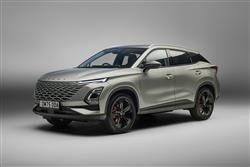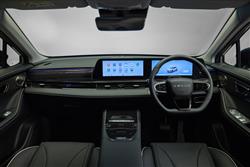Omoda 5 - ABC Leasing
How will you view?
This is a sample, showing 30 seconds of each section.
CHINA C(some text hidden)
By Jonathan Crouch
Ten Second Review word count: 49
The Omoda 5, here usefully improved, aims to offer something just a little different for customers seeking a compact family hatch or smaller crossover SUV. There's a choice of combustion or EV powertrains, striking design and a strong value proposition. If you like the looks, it might be tempting.
Background word count: 227
The Chery Group clearly listens to feedback. Just 18 months after launching this Omoda 5 model in both combustion and E5 electric form in the UK, the updated version of this car that we're looking at here was introduced, with mechanical and handling upgrades, extra equipment and cabin improvements. The Chinese move fast. So many new Oriental brands have been launched here in the last year or so that you might have forgotten about the Omoda 5, which has sold quite well in the Uk since its early 2024 introduction, despite less than glowing initial reviews. A quick reminder then: Omoda is part of the Chery group, probably the biggest Chinese automotive player you've never heard of. Chery is China's biggest car exporter, which is quite an achievement when you consider the other heavyweight manufacturers based there - names you might be more familiar with like BYD, the SAIC corporation's MG marque, GWM Ora and Nio. Omoda is a name derived from two sources; 'O' is for 'oxygen' (supposed to give an enviro-vibe) and 'moda' denotes fashion, apparently keynote for a marque that aims to focus on trendiness. As before, in both its firms the Omoda 5 is a car sized and pitched to appeal to customers of both family hatchbacks and light compact crossovers. So is it now worth taking a chance on this Oriental newcomer?
Driving Experience word count: 306
There are quite a few mechanical updates to this improved Omoda 5, some useful, some not. The petrol Omoda 5 has had its previous 190PS output cut to 147PS in an effort to improve frugality and emissions. Which haven't actually been improved much at all. Which is disappointing because thanks to that downgrade, the 0-62mph time has fallen from 7.8s to 10.1s, even though this power unit's 275Nm torque figure has remained the same. There's better news for folk interested in the E5 electric variant, which keeps the same single front-mounted 204PS motor, but now pairs it with a new 61kWh CATL battery offering a 267 mile range figure (10 miles more than before). And a heat pump is now standard-fit in order to preserve range during colder months. Hopefully more successful are the dynamic engineering changes. Both variants get revised front suspension geometry and a new electric steering set-up to improve handling. Plus new front wheel hubs and bearings feature and the brake linings have been 'refreshed'. We look forward to trying these changes but through the turns, we don't expect them to make an awful lot of difference to the business of propelling along nearly one and a half tonnes of Oriental metalwork - more of course with the EV. As before, the petrol unit comes as standard paired with a Getrag-sourced 7-speed dual clutch auto gearbox, though on the road (as before), you'll find that this transmission's indecisiveness sometimes hurts the drivetrain's general driveability and it tends to hunt around its ratios. There are various drive modes provided: obviously, to get anywhere near to the quoted efficiency stats, you'll need to spend most of your time in the 'Eco' setting. A four-wheel-drive version of the combustion Omoda 5 is offered in other markets but there's no sign yet of that being available here.
Pictures (High res disabled)

.jpg)
.jpg)
.jpg)
.jpg)
.jpg)
.jpg)
.jpg)

Scoring
Category: Compact Car
| Performance | |
| Handling | |
| Comfort | |
| Space | |
| Styling | |
| Build | |
| Value | |
| Equipment | |
| Economy | 50% |
| Depreciation | 60% |
| Insurance | 50% |
| Total | 65% |